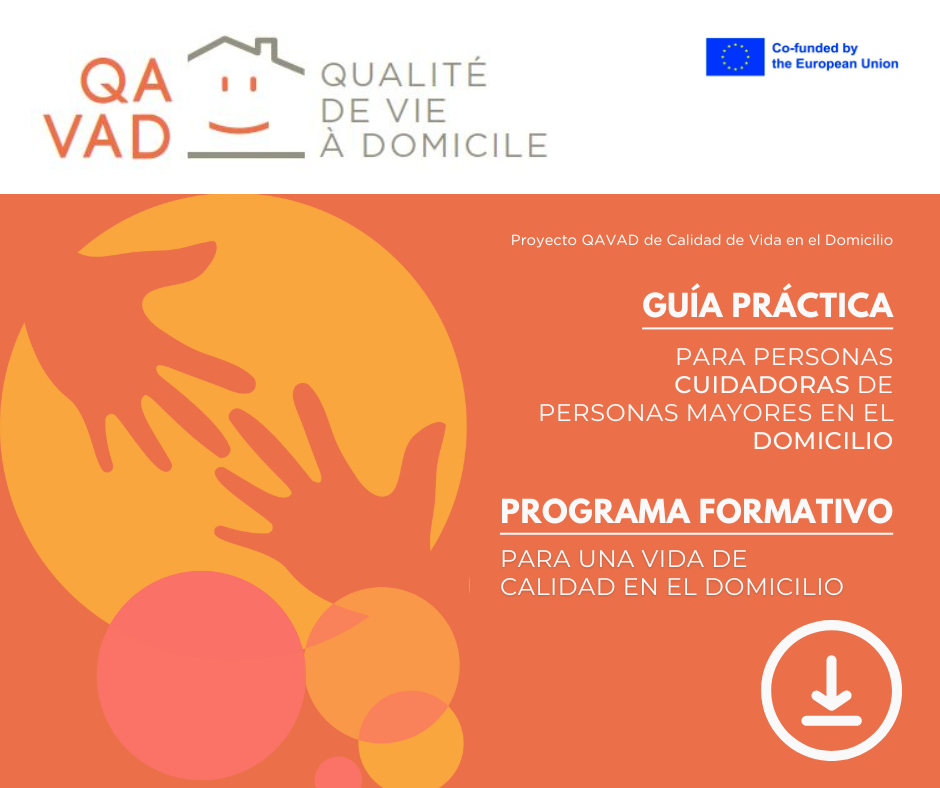Maintaining quality of life at home is an important generational issue for the countries of the European Union. The recent pandemic has been a good illustration of this.
With this in mind, the QAVAD (Qualité de Vie à Domicile) project, funded by the European Union's ERASMUS+ Programme, proposes to focus on the quality of life of elderly people at home. How? By promoting the necessary support for these people to maintain their autonomy, and also by supporting caregivers at home, both family members and professionals, as well as in the coordination of the actors involved in caregiving.
Over the three years of the project, we have involved a wide and diverse group of caregivers in the initiative. To this end, the so-called "Local Technical Committees" were set up in each of the territories. Through them, experiences and good practices have been gathered, as well as needs and proposals on the work that has been developed in the project. These contributions have been incorporated into the final products that we present today.
Once concluded, the QAVAD project offers us the following materials:
- Compilation and analysis of existing training and innovative experiences with regard to home care.
- A training programme on quality of life at home.
- A practical guide for carers of elderly people at home.
These are three products, complementary to each other, presented as free downloadable files (under Creative Commons licence) on the project website www.qavad.eu and on the respective websites of each partner mentioned above.
Inventory and analysis of innovative experiences and trainings (available in French and English)
Aim: to collect and identify the most innovative activities/"good practices" in the field of care for elderly people living at home in the QAVAD project partner countries (France, Spain, Italy, Denmark and Finland).
Outcome: the report includes a detailed description of 15 good practices selected from a total of 59 practices collected by the consortium members. It also includes an analysis of the selected practices as a whole, as well as a pedagogical analysis of the selected practices.
Training programme to promote quality of life at home (available in English and French)
Objective: to develop a training programme for family carers, professionals, service coordinators and volunteers.
Outcome: eight training modules that can be used as a whole or independently in specific modules according to needs.
- Module 1. Models, methods and knowledge of care.
- Module 2. How to do: professional tools, care activities at home.
- Module 3. Tools for home improvement.
- Module 4. Technology transforming care.
- Module 5. Caregiver well-being and coping strategies.
- Module 6. Interaction and communication.
- Module 7. Management.
- Module 8. Partnerships, networks and territory.
Download full text here.
Practical guide for carers of older people at home (available in English, Spanish, French, Italian and Finnish; soon in Basque).
Aim: to support carers, both family members and professionals and volunteers, in the care relationships that take place in the home between all the people involved, so that they have a practical tool to help them improve the quality of life of people with support needs and their own.
Result: a practical guide that, from the perspective of People-Centred Care, shows specific care situations in the home involving 4 elderly people with support needs and the people around them who support them. The Guide encourages reflection and participation of all those involved in care, provides ideas, recommendations, tools and general and local resources that can support us in care. The Guide addresses issues such as the ageing process, the basic concepts of person-centred care, some situations at home that require support, significant activities of daily living, housing and support products and caring for carers.
Download the full text here.

Led by Etcharry Formation Développement (EFD), a social work training organisation working at the heart of professional networks in the Pyrénées-Atlantiques and Landes (France), the QAVAD project has brought together the work of the following entities:
- Laguntza etxerat: home help service in the same region (FR),
- ICA SANTE association (FR)
- CEFAL, vocational training organisation based in Emilia Romagna (IT)
- Department of Educational Sciences, University of Bologna (IT)
- Solco Civitas: Consorzio di cooperative che svolgono servizi assistenziali, educativi e di animazione a domicili (IT)
- Randers Social- og Sundhedsskole: Training centre (DK) from September 2019 to February 2021.
- FIOH- Institute of Occupational Health (FI) - From April 2021 until the end of the project.
- Foibekartano residential and service centre for the elderly (FI) - From September 2021 until the end of the project.
- Matia Instituto and Matia Fundazioa, research centre and provider of socio-health services (ES)
- Nazaret Fundazioa: vocational training centre (ES).
